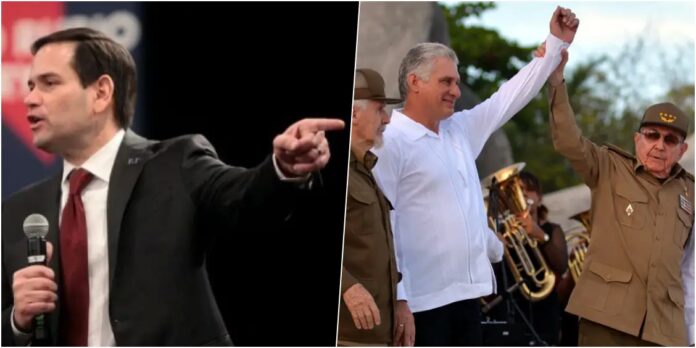HAVANA, Cuba – The Trump-Rubio duo has shaken the Cuban regime to its core. They were overly confident that Kamala Harris would replace the barely-feared Joe Biden in the White House, bringing a few more years of that silly game of the “unblocked blockade.”
A relaxation of sanctions, sprinkled with excessive niceties, has allowed the communists to reap massive benefits, as the ambiguities, loopholes, and cracks in the embargo have undoubtedly been the biggest boon for those who don’t need to produce anything because they’ve grown accustomed to living off scams, handouts, extortion, corruption, and double standards.
Now, as dreaming does indeed cost dearly, they have awakened in the midst of what could be the worst political scenario for those who have designed a “socialist economy” built on mass emigration, remittances, and over a hundred offshore companies—many of them based in the United States—focused on imports to the island, online sales, and parcel delivery. Above all, however, these companies operate as a silent influence network, always ready to act on the “combat order.”
Cubapack: GAESA’s MIPYME Operating in Miami
This setup, more political than economic, was designed by Cuban intelligence with the dual purpose of generating money while also cultivating pro-dictatorship allies among American businessmen, politicians, academics, and intellectuals. But this scheme could now be at risk of collapse—or at least dispersion or neutralization—if someone like Marco Rubio, an expert on Cuban affairs who will soon have the power to make more effective decisions, places it squarely in his line of vision as a critical target to provoke the implosion of Castroism, which grows weaker every day due to internal power struggles born from systemic corruption.
Confident in the power of its repressive apparatus, Castroism is increasingly convinced that neither an internal rebellion, no matter how strong, nor pressure from opposition groups (inside or outside the country) will be able to topple it—so long as no one cuts the umbilical cord stretching from Miami to Havana, carrying everything the dictatorship needs to sustain and strengthen itself.
With the election of the current Florida senator to his new position, there are growing opportunities for U.S. policy toward Cuba to focus objectively on the regime’s neuralgic points and finally break out of the prolonged standstill that has allowed the regime not only to profit from what should be bleeding it dry but also to ideologically infiltrate the U.S. political system. This includes attempts to influence elections on one hand and to compromise national security on the other.
This is even more alarming considering that in the last 10 years, Castroism has worked to solidify itself as the main unconditional ally of Russia and China—a reality the Biden administration has downplayed, despite the fact that this cooperation has extended into the military domain. This includes submarines and fleets docked in Havana Bay, troop exchanges, Cuban military training in Moscow, weapons and combat equipment upgrades, and, most critically, the establishment of military support protocols in case of social unrest or armed conflicts.
Not since the so-called “October Crisis” or “Missile Crisis” of the 1960s has the United States faced such a dangerous situation regarding Cuba’s alliance with Russia. And never before has Washington’s response to what is indisputably a direct threat been so tolerant—not to say “weak.” The administration has ignored what are not speculations but facts, openly reported by official Russian and Cuban media, as well as additional undisclosed details that can be easily verified through the frequency and level of exchanges, the composition of delegations, and the high-ranking military officials leading them.
Marco Rubio and the Key to Castroism’s Implosion
Marco Rubio, as the head of U.S. diplomacy and a knowledgeable expert on these dangers, as well as on the role played in favor of the dictatorship by Cuban regime influence groups in Florida—led by those “businessmen” who have thrived on the cracks in the “embargo” (and by a large portion of the recently arrived “renewed” immigrants who have taken advantage of a migration policy that does not distinguish between repressors and refugees)—will soon hold the key to triggering the mechanism for implosion. He will also have the power to put a stop to what is not just a silent invasion but a guerrilla war that began long ago—perhaps when OFAC first issued a license in favor of any frontman.
ARTÍCULO DE OPINIÓN Las opiniones expresadas en este artículo son de exclusiva responsabilidad de quien las emite y no necesariamente representan la opinión de CubaNet.
Sigue nuestro canal de WhatsApp. Recibe la información de CubaNet en tu celular a través de Telegram.




